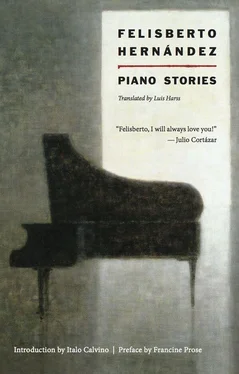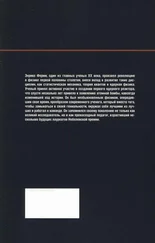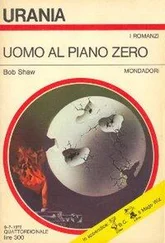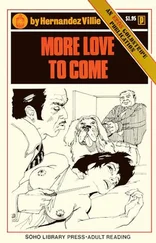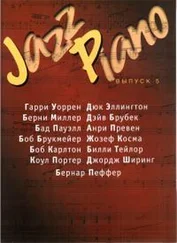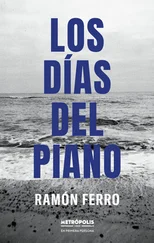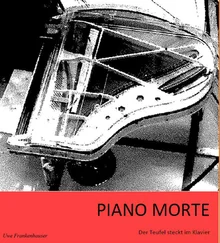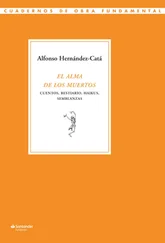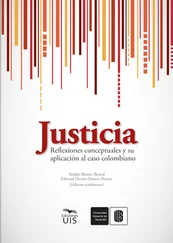Felisberto Hernandez - Piano Stories
Здесь есть возможность читать онлайн «Felisberto Hernandez - Piano Stories» весь текст электронной книги совершенно бесплатно (целиком полную версию без сокращений). В некоторых случаях можно слушать аудио, скачать через торрент в формате fb2 и присутствует краткое содержание. Год выпуска: 2014, Издательство: New Directions, Жанр: Современная проза, на английском языке. Описание произведения, (предисловие) а так же отзывы посетителей доступны на портале библиотеки ЛибКат.
- Название:Piano Stories
- Автор:
- Издательство:New Directions
- Жанр:
- Год:2014
- ISBN:нет данных
- Рейтинг книги:4 / 5. Голосов: 1
-
Избранное:Добавить в избранное
- Отзывы:
-
Ваша оценка:
- 80
- 1
- 2
- 3
- 4
- 5
Piano Stories: краткое содержание, описание и аннотация
Предлагаем к чтению аннотацию, описание, краткое содержание или предисловие (зависит от того, что написал сам автор книги «Piano Stories»). Если вы не нашли необходимую информацию о книге — напишите в комментариях, мы постараемся отыскать её.
Piano Stories
Piano Stories — читать онлайн бесплатно полную книгу (весь текст) целиком
Ниже представлен текст книги, разбитый по страницам. Система сохранения места последней прочитанной страницы, позволяет с удобством читать онлайн бесплатно книгу «Piano Stories», без необходимости каждый раз заново искать на чём Вы остановились. Поставьте закладку, и сможете в любой момент перейти на страницу, на которой закончили чтение.
Интервал:
Закладка:
“Let’s have the buck first.”
And after I had given him the money:
“Go soak your feet in hot water.”
The Two Stories
On the 16th of June, just before dark, a young man sat down at a small table where there were some writing materials. His intention was to capture a story and confine it in a notebook. For days he had been looking forward to the thrill of sitting down to write. He had promised himself to write the story very slowly, putting the best of himself into it. Finally, that afternoon, the moment had come. He worked in a toy shop and, while gazing at a slate board with red and blue beads strung across it on wires, he had suddenly realized he was ready to begin. He remembered another afternoon when he had been pondering a detail of the story and the manager of the shop had called him to account for not paying attention to his work; but his mood allowed him to efface all such ugly memories as soon as they appeared and go on with the thoughts that made him so happy. In the street, after work, these thoughts had also made him clumsy: his spirit freed, the minute he was out the door of the shop, he had delegated only a minimal part of himself to deal with the external world and get him home. While letting himself be drawn along by the small force to which he had entrusted the task of guiding him, he had concentrated heart and soul on his beloved story. At times the very intensity of his happiness had allowed him to abandon his happy thoughts for a moment to observe things in the street and try to find them interesting; but soon he returned to his story, still drawn along by the small force to which he had entrusted the task of guiding him.
In his room at last, he thought tidying up a bit before he got started might help him settle down. On the other hand, it seemed he would only keep stumbling over things, with his eyes, nose and forehead bumping into doors and walls. So in the end he decided to sit right down at the small table, which had short legs and was stained in walnut. After sitting down, he still had to get up once more to fetch a notebook in which he had written the date when the story began.
“The 16th of May was a Saturday and it must have been about nine in the evening when I met her. A moment ago I was remembering the person I was that night and the indifference I felt. I was also imagining that if the person I am now had told the person I was then, on the way out of her house, to note the date because it marked a great event, that other person would have accused this one of being decadent and falling into the trap of the commonplace. Nevertheless, the person I am now laughs at the one I was then, without stopping to ask himself whether the other would have been right or not. Moreover, he tries to recall even the smallest details relating to the other in order to laugh harder and to determine when and how the other started to be him. Further: he in interested in recalling the other because in that way he can also remember her. And not only that, if the truth be known: most of all, he is interested in writing this story so as to concentrate on her, and if he has made a note of the date when he met her, as the most commonplace lover would have done, it is because in this matter, even more than in everything else, he is not ashamed of not being original. A final warning: I worked out the date of that night with the help of a great friend who accompanied me that night and every other night until we were both convinced she loved me and not him.”
When he finished this paragraph he stopped, got up, and started to pace back and forth. The room was very cramped. He could have set the small table aside for more space, but he liked to bend over it and read what he had written. He could also have gone on with his task, but he felt a secret anguish: in order to write, which meant bringing back the events of the past, he had to distort his memories, and he was too fond of those events to allow himself to distort them. He had sat down with the purpose of telling everything exactly as it had happened — and soon realized that this was impossible. And that was when his vague and secret anguish began.
If distorting his memories provoked such anguish in him, even deeper and more secret was the reason why, the next day, his anguish was gone. The reason was the same one that made writing the story necessary for him and more intensely pleasurable than he could explain. Just as his mind had erased the ugly memory of the toy shop manager rudely breaking into his most cherished thoughts, so now it hid from him his deepest and most desperate reason for wanting to write the story. His mind was able to hide the reason from him in spite of himself, using the interminable arguments he had developed in the passage he was writing, but he knew what it was: that she no longer loved him.
“The person I was before meeting her was too worn out to feel anything but indifference. If we had met years before I would have consumed my energies in loving her, but, not having found her then, I had consumed all my energies in thinking: I had done so much thinking that I had discovered how vain and false thought is when it regards itself as the preeminent force directing our lives. And yet, despite knowing this, I had gone on thinking, wasting my energies in thought, until I felt unpleasantly worn out. The person I am now can find rest in the anxiety of loving as he pleases, but between the 19th of May — three days after our story began — and the 6th of June — the day I myself interrupted the story because early the next morning I had to leave the town where she lived — in the space of the eighteen days between those two dates, I found rest as well in her large blue eyes. There was a wide space, too, between those eyes and their brows, and from this vaporous blue vault with its dab of light blue shadow seemed to come whatever it was in her eyes that released me from my thoughts and made me love her and reach out toward her with my whole being.”
Although his mind hid the reason for writing the story from him, he may have felt something like a breath of misfortune following close behind him. It was, after all, his own mind that was preventing the impression that she no longer loved him from entering his thoughts, not only by burying it under the arguments with which he explained his motives for writing the story but also by clinging to the dates, as if securing them could also secure time and ensure her love for him. But that night of the 6th of June, after he had been with her, when he was in the hotel room with me, there was a moment when I detected the small burden of doubt still covertly weighing on his mind. It happened when he was telling me about her, wondering how long it would be before he saw her again, and, looking at the calendar, he noticed the number 6, which marked the day we were on, and said, “What a strange 6! It’s like an animal sitting there. . with its tail curled around it.” That was when I saw the small burden of doubt still covertly weighing on his mind, and it must have been when he felt the breath of misfortune following close behind him.
Many years before, when his thinking had begun to torture him, he had found rest in another pair of blue eyes. From among the things he wrote then I have chosen the ones that best gave me the feeling for what he knew about himself. They were three fragments: The Visit, The Street and The Dream .
The Visit
Last night I was forced to attend to some thoughts. At moments they tired me and then I wanted to ignore them, if only for a few seconds, but I knew how important they were and that I couldn’t overlook them. I allowed myself to rest only if someone interrupted me to ask me something; doing anything to distract myself would have been cheating. It was all right when some spontaneous event interrupted my thoughts, but I mustn’t be lying in wait for the opportunity, on the contrary: even if the opportunity presented itself and I was glad for the rest, I had to regret the interruption. Something similar used to happen to me as a child when I had to recite a lesson I didn’t know: if I needed to cough I was glad because it postponed the torment and, meantime, something important might happen to get me off the hook, but if I coughed on purpose the teacher caught on. Back in those days it would have seemed incredible to me that now, as a grownup, I’d oblige myself to do something as if the teacher were inside me.
Читать дальшеИнтервал:
Закладка:
Похожие книги на «Piano Stories»
Представляем Вашему вниманию похожие книги на «Piano Stories» списком для выбора. Мы отобрали схожую по названию и смыслу литературу в надежде предоставить читателям больше вариантов отыскать новые, интересные, ещё непрочитанные произведения.
Обсуждение, отзывы о книге «Piano Stories» и просто собственные мнения читателей. Оставьте ваши комментарии, напишите, что Вы думаете о произведении, его смысле или главных героях. Укажите что конкретно понравилось, а что нет, и почему Вы так считаете.
